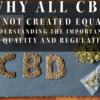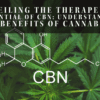
As you browse the world-wide-web for CBD-rich products — you’ll likely come across another, but not equal, derivative — hemp oil.
Unbeknownst to you, hemp oil and CBD oil are not the same. Although the hemp leaf on the packaging may convince you, hemp oil serves an entirely different purpose than CBD oil.
If you’re ready to experience the therapeutic effects of CBD oil — read this guide to buy the right product.
The Glaring Differences Between CBD Oil and Hemp Oil
Now, let’s discuss the glaring differences between CBD oil and hemp oil.
You’ll be adequately equipped to make the right choice once you understand what separates these two hemp-derived products.
Flowers vs. Seeds
First and foremost, let’s talk about where CBD oil and hemp oil comes from.
CBD oil is extracted from hemp flowers.
CBD extractors focus on the flower because it’s jam-packed with cannabinoids — specifically CBD. If you were to look at hemp-based flowers, you would notice many crystal-like structures that are sticky to the touch. These structures are called trichomes, which house cannabinoids and terpenes.
Alternatively, hemp oil is derived from hemp seeds.
Hemp seeds contain a natural oil, which, when pressed, expel a unique oil that rivals that of avocado oil.
The Effects of CBD Oil and Hemp Oil
Now, let’s talk about the effects of CBD oil and hemp oil. As you can imagine, this is the most significant difference between the two hemp-derived products.
When it comes to CBD oil, you have three choices — full-spectrum, broad-spectrum, and CBD isolate. Depending on the type of CBD oil, the effects may differ slightly.
Overall, the effects of CBD oil are:
- Relaxation
- Enhanced mood
- Reduced pain
- Increased focus
However, CBD oil goes a step further by providing therapeutic effects, such as:
- Moderates the appetite
- Decreases depression and anxiety
- Relieves chronic pain
- Supports individuals with epilepsy
- Provides anti-cancer support
- Increases neuroprotective qualities
- Supports a good night’s rest
As you can see, CBD oil provides effects that benefit individuals seeking daily support. Thus far, current and ongoing research points towards CBD for an increase in overall wellbeing.
On the other hand, hemp oil is loaded with beneficial nutrients, minerals, and antioxidants.
Therefore, hemp seed oil is primarily used to boost the nutritional quality of food. Furthermore, hemp oil is also a popular additive to beauty products due to its antioxidant properties.
The effects of hemp oil are:
- Vibrant and smooth skin
- Protection from the sun’s oxidative effects
- Boost the immune system
As you can see, hemp oil is primarily used by individuals that seek skin and diet support.
Is There THC In Hemp Oil or CBD Oil?
Once again, depending on the type of CBD oil — there may be extremely low THC levels.
Overall, full-spectrum CBD oil contains less than 0.3% THC, which is considered a negligible amount by the federal government. Broad-spectrum CBD oil and CBD isolate are void of any THC.
However, you will not experience the psychoactive effects of THC in any CBD oil product. Remember, the amount of THC in full-spectrum CBD oil is low, which means you’d need to consume a lot to feel minimal psychoactive effects of THC.
As for hemp oil — there isn’t any THC within. The primary reason why hemp oil is void of THC is that hemp oil is derived from the seed. Remember, cannabinoids, such as THC and CBD, are only found in trichomes, which reside on the hemp flower.
The Entourage Effect
One of the most important benefits of consuming full-spectrum CBD products is the entourage effect.
The entourage effect is believed to enhance the overall efficacy of each cannabinoid present. Therefore, CBD’s therapeutic nature increases when combined with other cannabinoids, such as THC, CBG, CBN, and CBC.
In other words, researchers believe that consuming CBD oil that contains additional cannabinoids is more effective than isolated CBD products.
On the other hand, hemp seed oil does not promote the entourage effect because it’s completely void of cannabinoids and terpenes.
Legality
Although hemp oil and CBD oil are legal under federal guidelines, there is a difference in legality.
As you browse a local grocery store for hemp-based products, it’s unlikely that you’ll come across CBD-rich oils. Why? Many grocery store chains are unwilling to list products that contain a fraction of THC — even though it would be completely legal.
For instance, when you type “CBD oil” into the search engine on Amazon — you’ll only find hemp seed oil products.
However, you may find CBD-rich products, such as CBD oil, via online vendors. Remember, you must always purchase lab-tested CBD oil to ensure the vendor is selling high-quality CBD products.
When To Take CBD Oil or Hemp Oil
Ultimately, deciding between CBD oil and hemp oil depends on your goal.
If you want to boost your diet’s nutritional quality, hemp seed oil may be the right choice. However, if you want to explore the therapeutic mental and physical benefits that CBD oil has to offer — it’s recommended that you buy a lab-tested CBD oil.
Mental and physical issues, such as anxiety and arthritis, plague millions of individuals daily. If you need mental or physical backup — CBD oil is the decisive winner.
Experience The Therapeutic Properties of CBD
If you’re ready to experience relief — there’s no better option than CBD oil.
CBD oil is the go-to for countless individuals that need a break from the stress of day-to-day living, from its ease-of-use to its long-lasting effects. Although you can spice up your meals with hemp seed oil, nothing comes close to the mental and physical support that’s unlocked by CBD oil.
CBD oil is only the tip-of-the-iceberg when it comes to CBD-based products. Ready to discover what CBD has to offer? Head to Real Releaf CBD to experience the true potential that CBD has to offer.



